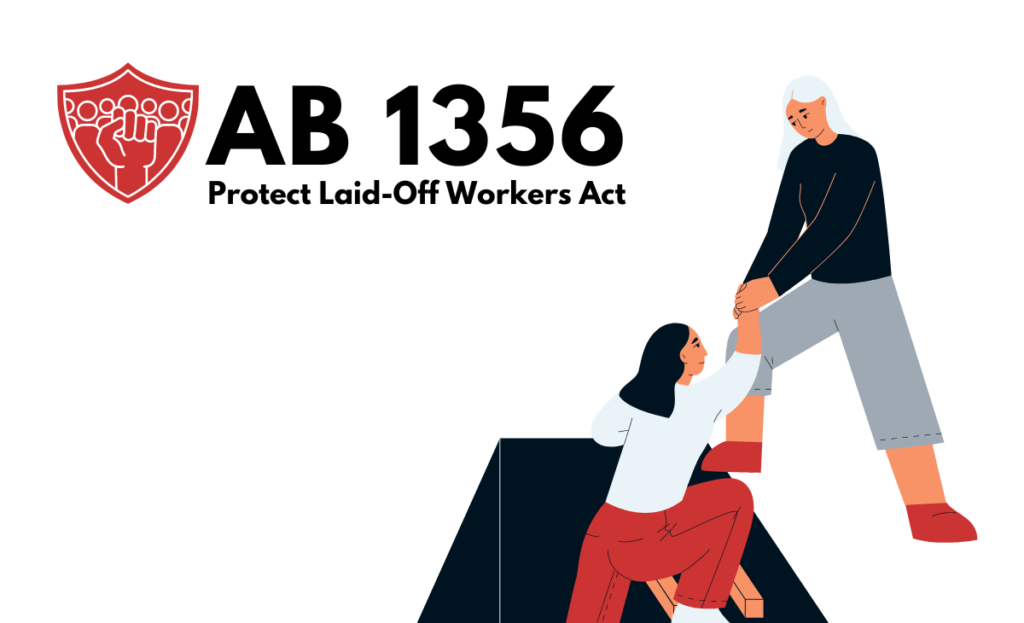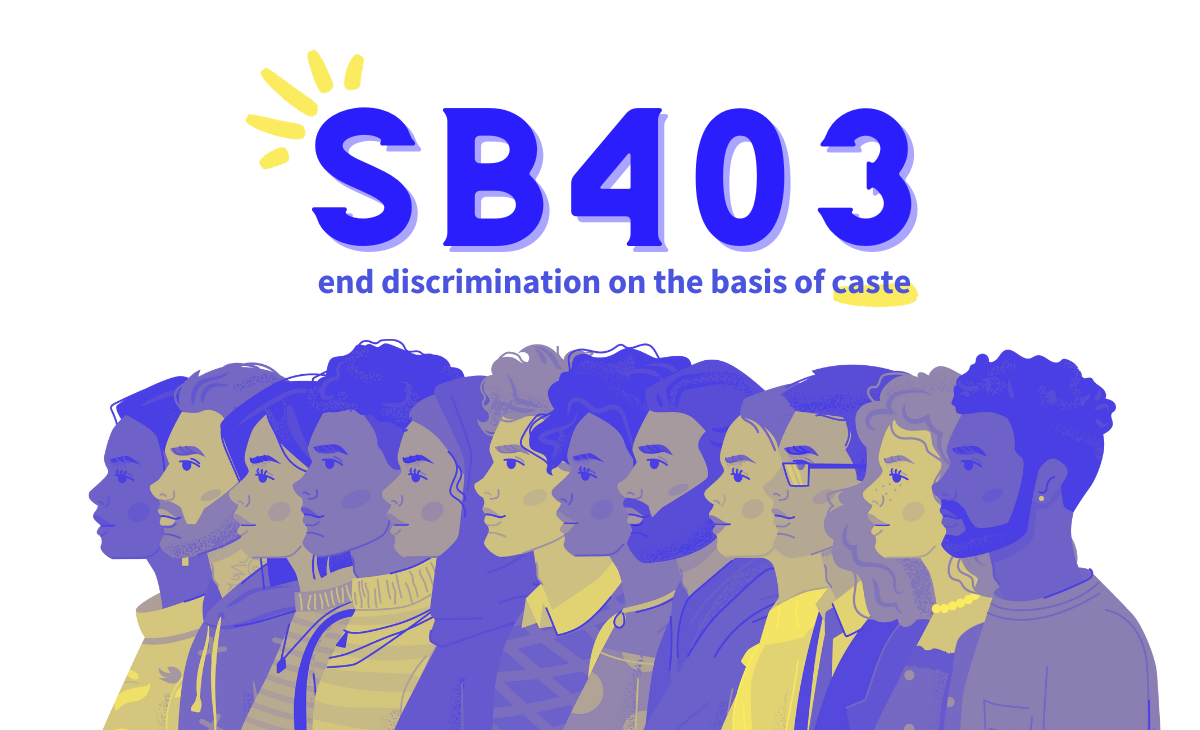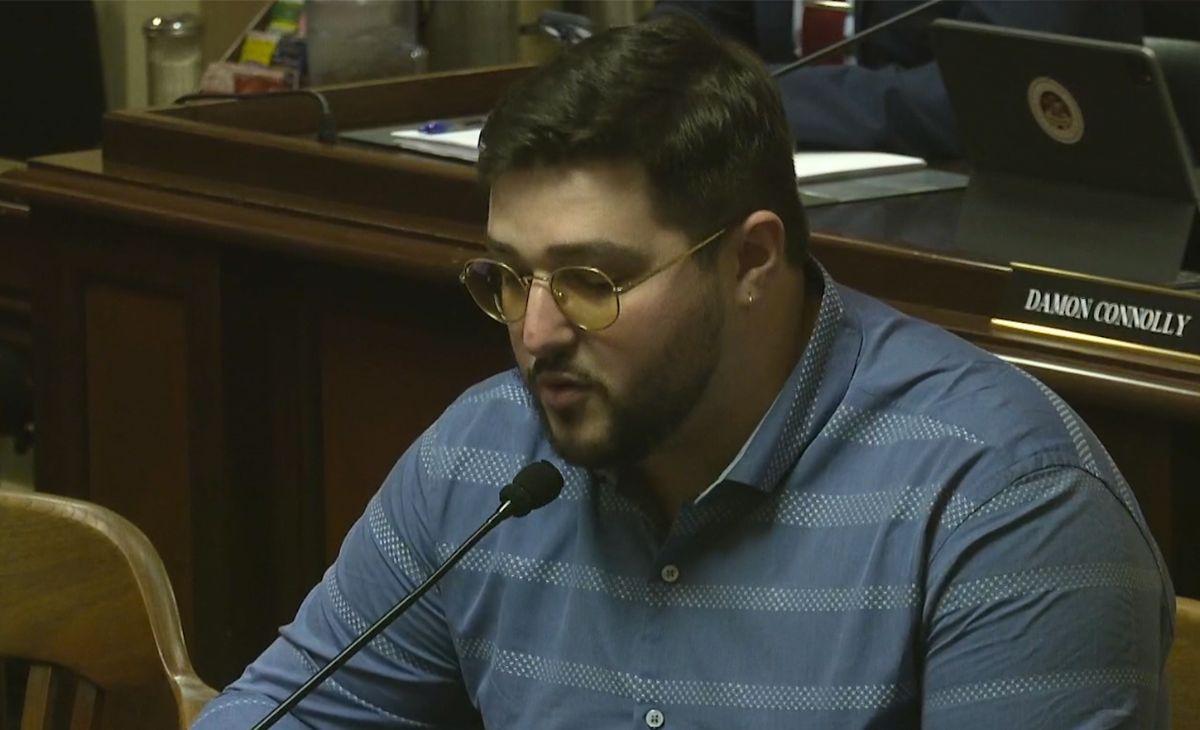TechEquity’s 2023 Legislative Agenda

At TechEquity, we envision a world where the growth of the tech industry creates economic prosperity for everyone. We focus on addressing inequities within the tech industry and inequities that result from tech products and companies.
We work on systems change that enables economic stability for workers and society as a whole. We bring tech worker capacity, as well as research and policy insights, to grassroots movements for labor and housing justice. Public policy is a core piece of our theory of change. In order to make structural changes to the way power and resources are shared in our society, we need bold public policy and regulation to provide guardrails and safety nets where needed.
Below is an overview of our sponsored and priority legislation for the 2023 California legislative session.
Sponsored Legislation
What does this mean? We have partnered with an elected official to develop and lead the efforts to ensure these bills will become law. We’re aggressively campaigning on the legislation, leading coalition tables, and helping engage our members and other communities on why these bills are vital to our mission.

AB 1356 – Protect Laid Off Workers Act
Author: Assemblymember Matt Haney (AD-17)
What does the bill do?
AB 1356 strengthens California’s Worker Adjustment and Retraining Notification (WARN) Act by expanding protections for workers impacted by mass layoffs. Specifically, it requires companies to give 90 days notice prior to a mass layoff, guarantees that workers do not have to waive their legal rights to be protected by the WARN Act, and extends mass layoff protections to contract workers.
Why is this bill critical to our mission and issue areas?
As part of our Contract Worker Disparity Project, we found that contract workers in tech were disproportionately women, non-binary, and people of color. Since those findings were released we have partnered with contract workers and worker advocates around the country to identify opportunities for structural change to improve working conditions, hold companies accountable for the abuse of these practices, and ensure contract workers are supported through the unique difficulties they face due to their employment arrangements.
Recent layoffs in the tech industry have captured headlines, with 350,000 workers laid off since the beginning of 2022. Since July of 2022, over 84,000 workers in California alone have been affected by a mass layoff. Twitter, the poster child of recent downsizing, laid off 3,700 workers in November of the same year—a move that drew headlines and widespread concern. Largely missing from the coverage, however, was that 4,400 contract workers were also laid off, and sent home with nothing because the WARN Act currently does not cover many of them.
WARN has left behind thousands of workers, with the potential to leave millions in the lurch. California’s contract and temporary workforce comprises approximately 1.9 million employees. In 2018, contract workers at Google outnumbered direct-hire employees, 150,000 to 144,000. The recent layoffs at Meta—noted at the time for their generous layoff packages— did not include contract workers such as campus cafeteria workers, who now must urge the company to provide severance.
Employment of third-party contract workers is not isolated to the tech industry. Since the Great Recession, temporary employment in all sectors has increased 75% compared to 19% in total employment. This large and disproportionately diverse workforce often does not have the same protections as the rest of the workforce. This bill changes that by explicitly extending the WARN Act to millions of contract and temporary workers in California.
Moreover, existing protections must be updated to reflect workers’ current economic reality: a third of Californians don’t have enough savings to cover basic necessities in the event of an unexpected job loss. 1 in 3 Californians has had to reduce meals or cut back on food to save money. Only 55.7% of families in California have emergency savings. 8 in 10 Californians who can’t afford basic needs live in working families. For many low- and middle-income families, an unexpected job loss can mean financial catastrophe.

SB 403 – Ending Caste Discrimination in California
Author: State Senator Aisha Wahab (SD10)
What does the bill do?
SB 403 adds caste—a system of social stratification and exclusion—as a protected category in the state’s anti-discrimination laws. While tech has made many promises to address racial inequities across the industry, caste discrimination goes largely ignored. You may have heard that Google canceled an event with Thenmozhi Soundararajan about this very topic. We think this important equity issue has gone overlooked for too long in tech and beyond.
Why is this bill critical to our mission and issue areas?
Because the caste system encourages people to stay within their own social strata, this can mean that someone’s caste can impact their hiring, education, and housing outcomes. For example, in Silicon Valley, a quarter of technical roles are held by Indian Americans. However, they’re almost exclusively by dominant castes. Lower-caste workers, sometimes referred to as “Dalits” in South Asia, report experiencing casteist slurs, discriminatory hiring and firing, sexual harassment, and aggressive searches for evidence of a closeted Dalit’s caste.
This search for evidence of caste may be difficult for outsiders to discern, but questions about what temple someone attends, the village their family grew up in, or what kind of job their parents hold can all be ways to try to narrow in on which caste someone belongs to. According to a Wired article, Trapped in Silicon Valley’s Hidden Caste System, “A pat on the shoulder might be a friendly greeting—or a search for a sacred thread that some dominant-caste Hindu men wear beneath their shirts.”
The consequence of being “found out” as one caste or another can lead to career immobility, harassment in the workplace, exclusion from opportunity, or preferential treatment if you are from the “right” caste.
We need to be declarative and explicit that caste is a protective class, as shown in a recent case that the California Department of Civil Rights brought against Cisco for alleged caste discrimination against an employee. To avoid accountability, Cisco filed a demurrer and a motion-to-strike petition to dismiss the case because Cisco is alleging that caste and ethnicity are not protected classes under the Fair Employment and Housing Act.
Within 3 weeks of the Cisco case becoming public, over 260 tech workers reported experiencing caste-based discrimination in the workplace.
Priority Legislation
What does this mean? We have joined a coalition to ensure these bills’ passages. We’re educating, engaging, and activating our members to support the passage of these bills.
We Believe that Every Worker Matters
Ensuring that a tech-driven economy works for everyone means that every job—whether in tech or not—should be a good job. That means expanding on-ramps to jobs in tech as well as strengthening worker protections across the labor force. The legislation below reflects our priorities for the 2023 legislative session in California.
AB 524 (Wicks) – Family Caregiver Anti-Discrimination Act
AB 524 addresses family caregiver discrimination by simply prohibiting the discriminatory treatment of employees because of their status as a family caregiver. In other words, the bill prohibits employers from treating a worker adversely based on assumptions or stereotypes associated with caregivers. Specifically, the bill would add “family caregiver status” to the the list of protected characteristics (e.g., race, sexual orientation, marital status, religion, etc.) that are already prohibited bases of discrimination under the employment provisions of the Fair Employment and Housing Act (FEHA).
SB 497 (Smallwood-Cuevas) – The Equal Pay and Anti-Retaliation Act
SB 497 would create a rebuttable presumption that a negative action against an employee is retaliatory if it occurs within 90 days of reporting a labor or equal pay violation. The bill would also allow whistleblowers who experience retaliation to collect a penalty of up to $10,000 that currently only the state may collect from lawbreaking employers. A majority of California workers who report violations to their employer or the government experience retaliation. When workers are too afraid to speak up, wage theft, unequal pay, and workplace hazards are allowed to flourish, making our communities less safe and equitable.
We Believe that We All Belong Here
The housing crisis is the major driver of inequality in California. To fix it, we need to take a multi-pronged approach that recognizes the disproportionate burden that low-income communities of color bear for housing instability.
AB 919 (Kalra) – Stable Homes Act
AB 919 will give tenants and mission-driven nonprofits the first opportunity to buy rental housing when the owner decides to sell the property. This will keep tenants in their homes and preserve the units as permanently affordable, thereby preserving needed housing that might otherwise be lost to the speculative market.
Note: AB 919 no longer has enough political support to move forward in the legislative process.
SB 594 (Durazo) – Beneficial Owner Transparency Act
SB 594 would amend Limited Liability Company (LLC) registration requirements so property rental companies have to provide the name(s) of the owner or person(s) with substantial control. Many LLCs are owned in the name of another LLC, creating additional layers of anonymity that enable unlawful conduct – such as tenant harassment, aggressive evictions, and Emergency Rental Assistance Program (ERAP) fraud. Anonymity is not necessary to achieve the legal and financial protection afforded by forming an LLC or Real Estate Investment Trust (REIT).
Note: SB 594 no longer has enough political support to move forward in the legislative process.
SB 567 (Durazo) – Homelessness Prevention Act
SB 567 would help prevent homelessness by increasing stability and affordability for renter families by lowering the limit on how much landlords can increase rent and limiting no-fault evictions. In addition, it would increase the number of households receiving the protections, and make it easier for them to enforce their rights when landlords have violated them. The Homeless Prevention Act will better protect California’s low-income renters from unjust evictions and exorbitant rent increases.
Support Legislation
What does this mean? We believe these bills are important to our issue areas. We have not prioritized them due to capacity constraints but will educate our members on them and will take action whenever possible to ensure their passage.
We focus on supporting legislation that is aligned with our mission, our initiatives, and our values. We do this through participation in a set of coalitions that are aligned around those areas of our work, including:





